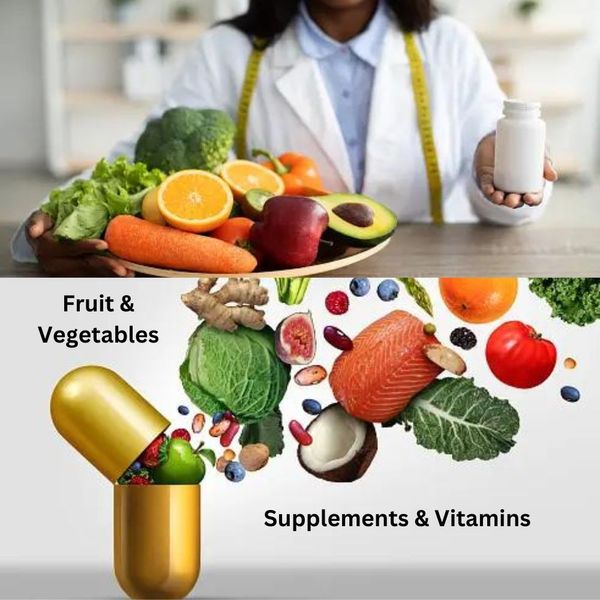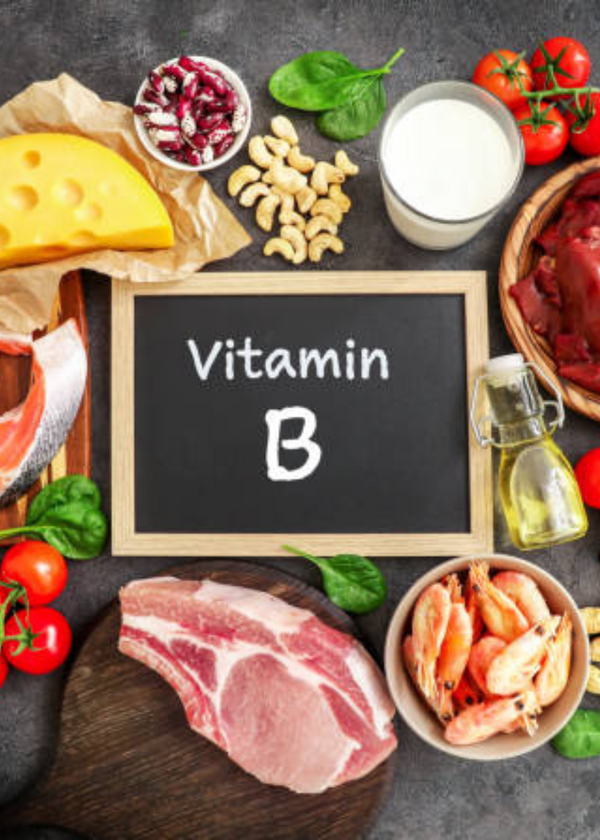Are you aware of the amazing benefits of Vitamin D3? If not, you should be! Vitamin D3 is an essential nutrient for maintaining optimal health and well-being.
Not only does it support healthy bones, teeth, and muscles by promoting calcium absorption, but research also suggests potential benefits to heart health, brain function, immune system regulation, and even depression. Knowing that vitamin D3 is so beneficial makes it even more concerning that many individuals are still deficient in this important nutrient.
In this blog post, we will look at how to meet your daily needs of vitamin D3 through diet and supplementation to enjoy the amazing health benefits it offers!
Why We Love It
Vitamin D3, also known as the sunshine vitamin, is one of our favorite supplements for good reasons. This essential nutrient supports strong bones, muscles, and overall immune health. It's also a vital component for the absorption and supplemental vitamin D metabolism of calcium and phosphorus, which help keep our bodies functioning at their best.
But what sets vitamin D3 apart is its unique ability to synthesize amino acids, essential building blocks of protein, which are vital for the growth and maintenance of our tissues, muscles, and organs.
With so many benefits, it's no wonder why we love vitamin D3, and why it's an essential component of any healthy lifestyle.
How We Chose It
Vitamin D3 has become increasingly popular in recent years due to its numerous health benefits. But how did we choose this particular supplement?
Well, it all comes down to the importance of vitamin D in our bodies. Vitamin D3, in particular, is the form of vitamin D that is produced by our skin when exposed to sunlight. Unfortunately, many of us don't get enough of it. That's where supplements come in.
When choosing a vitamin supplement, we looked for one that included additional ingredients to enhance its effectiveness, such as amino acids. Amino acids are the building blocks of protein and can help support muscle growth and repair. By combining vitamin D3 with amino acids, we found a supplement that not only supports bone health but also muscle health, making it a great addition to our daily routine.

Best for a boost for physical activity and athletic support.
Sports Research Vitamin D3 + K2
Sports Research Vitamin D3 + K2
Many athletes and active individuals are keenly aware of the numerous benefits that come with a healthy lifestyle, and one of the most important parts of any diet is making sure to get the right nutrients to maximize performance.
Vitamin D3 & K2 with 5000iu of Plant-Based D3 & 100mcg of Vitamin K2 as MK-7 helps ensure that these goals can be achieved, providing essential supplementation with top-notch ingredients that are Non-GMO Verified and Vegan Certified. Vitamin D3 & K2 provide an important boost for physical activity and support athletes in maintaining optimal nutrition for raising their game to the next level.

Best for Bones, Teeth, Muscles, Cardiovascular, and Immune Function
Thorne Vitamin D-5000 - Vitamin D3
Thorne Vitamin D-5000 - Vitamin D3
If your body needs an additional boost of vitamin D3, Thorne Vitamin D-5000 is the perfect supplement to promote all-around health. This easy-to-take capsule provides your body with a 5,000 IU dose of vitamin D3 that is NSF Certified for Sport and guaranteed to be both dairy and soy free.
Ultimately, this powerful supplement supports bones, teeth, muscles, and cardiovascular as well as immune function. Just take one Nutri -Caps tablet daily and keep your body feeling energized and strong! Don’t wait any longer - give your body the extra support it needs with Thorne Vitamin D-5000.
Nature’s Bounty Vitamin D3 Supplements
Best for Immune Support
Nature's Bounty Vitamin D Immune Support Softgels are the perfect way to get your daily dose of Vitamin D3. This dietary supplement contains 2000 IU of Vitamin D per serving, which is essential for supporting a healthy immune system. These soft gels contain natural ingredients and are preservative-free, vegetarian, and gluten-free.
The bottle contains 350 capsules making it easy for you to stay stocked up on this vital nutrient so you can support your overall health and wellness. With Nature's Bounty Vitamin D, Immune Support, 2000 IU, and Softgels you can power yourself with nature's bounty!

Best for Bone, Teeth, Muscle, and Immune Health Support
Nature Made Extra Strength Vitamin D3
Nature Made Extra Strength Vitamin D3
Vitamin D3 is essential for optimal health and can be obtained from foods like fatty fish, dairy products, and egg yolks. If you're looking for an easier way to get your recommended daily dose of Vitamin D3, Nature Made Extra Strength Vitamin D3 5000 IU (125 mcg) is here to help.
This dietary supplement provides all the benefits of Vitamin D3 plus extra support for your bones, teeth, muscles, and immune system. Each soft gel contains its full potency vitamin in a convenient 180-day supply so you can get the most out of every pill. Plus, they're easy to take on the go – so don’t worry about missing out on the power of Vitamin D3!
NatureWise Vitamin D3
Best for Healthy Muscle Function, and Immune Support
NatureWise Vitamin D3 5000iu offers optimal health benefits for maximum muscle function, immune system support, and general well-being. With one year's supply of convenient mini soft gels in cold-pressed olive oil, getting your daily dose of Vitamin D3 has never been easier or more reliable.
Ensuring maximum effectiveness, the vitamin is non-GMO and gluten-free, giving those who need it an easy way to get all the health benefits without worry. Enjoy a 365-day guarantee of a healthier lifestyle with Vitamin D3 from NatureWise!
What You Should Know
-Vitamin D helps your body absorb calcium.
-Vitamin D supplements are used to treat adults with severe vitamin D deficiency, resulting in loss of bone mineral content, bone pain, muscle weakness, and soft bones (osteomalacia). Osteoporosis.
-Causes for vitamin D deficiency are many, including diseases or conditions that limit fat absorption and the breakdown of vitamin D in the gut.
- About 1 billion people worldwide have vitamin D deficiency, while 50% of the population has vitamin D insufficiency.
- Vitamin D is a fat-soluble vitamin that depends on the gut's ability to absorb dietary fat. People who are obese tend to have lower blood vitamin D levels. The Tolerable Upper Intake Level is the maximum daily intake unlikely to cause harmful effects on health.
-People who have undergone gastric bypass surgery may require vitamin D supplementation.
- Depending on where you live and your lifestyle, vitamin D production might decrease or be completely absent during the winter months. Sunscreen, while important to prevent skin cancer, also can decrease vitamin D production.
-The use of sunscreen decreases exposure to UVB light and therefore lessens vitamin D absorption. Excessive sun exposure puts you at an increased risk for skin cancer.
-The flesh of fatty fish (such as trout, salmon, tuna, and mackerel) and fish liver oils are among the best sources of vitamin D.
-There are a few foods that naturally have some vitamin D, including Fatty fish such as salmon, tuna and mackerel, and sardines. Rainbow trout. Beef (cow) liver. Mushrooms. Egg yolks. Cod liver oil. You can also get vitamin D from fortified foods.
-The Recommended Dietary Allowance for vitamin D provides the daily amount needed to maintain healthy bones and normal calcium metabolism in healthy people. It assumes minimal sun exposure.
- During pregnancy, doses of vitamin D greater than the recommended dietary allowance should be used only when needed.
-vitamin D metabolites assist in mobilizing calcium and phosphate from bone and likely increase the reabsorption of calcium and perhaps also of phosphate via the renal tubules 12, 13, 14.
-Tell your doctor if you have ever had: heart disease; chronic kidney disease; Crohn's disease or an electrolyte imbalance.
- Association between serum 25-hydroxyvitamin D level and upper respiratory tract infection in the Third National Health and Nutrition Examination Survey.
-The first hydroxylation of vitamin D3 cholecalciferol (or D2) occurs in the liver to yield 25-hydroxyvitamin D while the second hydroxylation happens in the kidneys to give 1, 25-dihydroxy vitamin D 12, 13, 14.
-Hypertension, more commonly known as high blood pressure, is a cardiovascular disease commonly seen in people with vitamin D deficiency.
-Vitamin D supplementation and total cancer incidence and cancer mortality: a meta-analysis of randomized controlled trials.
-Although vitamin D does not seem to be a major factor in reducing cancer incidence, evidence including that from randomized trials suggests that having higher vitamin D status may improve survival if one develops cancer.
-Studies suggest that people who get enough vitamin D and calcium in their diets can slow bone mineral loss, help prevent osteoporosis and reduce bone fractures. Osteomalacia and osteoporosis put you at an increased risk for bone fractures. Insufficient vitamin D is also connected to osteoporosis.
-Many tissues have vitamin D receptors and some convert 25(OH)D to 1,25(OH)2D.
-Increases in parathyroid hormone stimulate the mobilization of skeletal calcium and the renal excretion of phosphorus 4.
- Inadequate vitamin D levels can adversely affect muscle strength and lead to muscle weakness and pain.
-Medical conditions, weight loss surgeries, certain medications, and several different biological and environmental factors can put one at a greater risk of developing vitamin D deficiency, such as older age and the amount of melanin (pigment) in your skin.
- A lack of either of these enzymes leads to an inadequate level of active vitamin D in your body.
- Most trials of the effects of vitamin D supplements on bone health also included calcium supplements, so isolating the effects of each nutrient is difficult.
-US Preventive Services Task Force, et al. Screening for vitamin D deficiency in adults: US Preventive Services Task Force recommendation statement. JAMA.
-Preventive Services Task Force does not recommend routine vitamin D screening in adults without symptoms of deficiency.
-Your body also makes vitamin D when direct sunlight converts a chemical in your skin into an active form of the vitamin (calciferol).
- Several case-control studies, when analyzed together, suggest that people diagnosed with tuberculosis have lower vitamin D levels than healthy people of similar age and other characteristics.
-Dietary Reference Intakes for Calcium and Vitamin D. Washington, D.C.: National Academies Press, 2010. https://www.ncbi.nlm.nih.gov/books/NBK56070/ Holick MF. Vitamin D deficiency.
Vitamin D3 FAQs
Knowing how to choose the right supplement isn’t always easy. We have collected a list of the most frequently asked questions. Read on to find out more about vitamin D3 and which product is right for you.
What is vitamin D3?
Vitamin D3, or cholecalciferol, is an essential nutrient that plays a vital role in maintaining healthy bones and teeth. It helps regulate the absorption of calcium and phosphorus from food sources. Vitamin D3 is found naturally in some foods, including fatty fish (like salmon, mackerel, and tuna), beef liver, and egg yolks. It can also be made by the body through exposure to sunlight - this is why it’s referred to as “the sunshine vitamin”!
Vitamin D3 supports many different functions in the body - such as helping to ensure strong bones by promoting sufficient calcium absorption; keeping our muscles healthy by aiding with nerve transmission; helping protect us against infections like influenza; regulating cell growth and tissue differentiation; supporting cognitive functioning; assisting in the regulation of hormones like testosterone, progesterone and testosterone precursor dehydroepiandrosterone (DHEA); among others.
Research suggests that some populations may not get enough vitamin D through dietary supplement intake alone - especially those who possess darker skin tones since these people have a harder time absorbing ultraviolet radiation from sunlight due to higher concentrations of pigment-producing melanin within their skin cells. Supplementation may be beneficial for individuals who believe they aren't getting enough of this essential nutrient from food sources or extended sun exposure.
In addition to population-specific recommendations regarding adequate vitamin D levels of supplementation for deficiency prevention/treatment purposes — pregnant women are advised to maintain a daily dosage between 600–800 IU (International Units) throughout the gestation period for optimal fetal development outcomes — there are other potential applications for increasing one's daily intake of this nutrient which include reducing risk factors associated with certain chronic diseases or improving symptoms associated with autoimmune disorders such as psoriasis or multiple sclerosis. Research continues on these topics so new developments should continue arriving regularly in the future!
What are the benefits of vitamin D3 and why is it important for our health?
Vitamin D3 is an essential nutrient that comes from two sources: fortified foods and supplements, or natural production through sun exposure. It has several important functions in the body, including aiding calcium absorption necessary for strong bones and teeth, promoting healthy cell growth, supporting muscle strength and nerve function, boosting immune system health to fight off diseases and infections, regulating blood pressure levels to prevent stroke or heart attack risk, improving moods by alleviating depression symptoms caused by seasonal changes in sunshine exposure (seasonal affective disorder), helping protect against certain illnesses such as diabetes mellitus type 1 and multiple sclerosis.
Vitamin D3 is also vital for cognitive performance. Research indicates that a deficiency of this nutrient may be associated with dementia. Studies have found that higher concentrations of vitamin D3 improve spatial memory retention in both humans and mice. It may also help improve concentration ability as well as reduce learning difficulties commonly seen among children with autism spectrum disorders.
Furthermore, research suggests that vitamin D3 plays an important role in cancer prevention - especially breast cancer - since it helps regulate hormones that can suppress tumor cells' growth while repairing damaged DNA strands inside them which may otherwise lead to uncontrolled mutations resulting in the formation of malignant tumors with time if left unchecked. In addition to this preventive effect on some forms of cancer like prostate cancer too; it's believed to reduce risks & slow down existing cancers within our bodies when consumed regularly over long durations either via diet (animal fats) or supplementation/sunlight exposure processes due to its anti-inflammatory properties & cell-strengthening capabilities!
How much vitamin D3 should I take?
Taking the right amount of Vitamin D3 is important for maintaining your health and preventing various diseases. Depending on a range of factors, including age, body weight, and skin color - individuals may require different amounts of vitamin D3 to reach their optimal intake levels.
For adults aged 19-50 years old, it’s generally recommended to take 600-800IU (15-20mcg) daily. Older adults should aim for slightly higher intakes between 800-1000IU (20-25mcg). People living in northern climates or with darker skin tones need more because they receive less vitamin D from sunlight exposure – in these cases, it’s suggested that intakes up to 2000IU (50 mcg) are safe.
Of course, too much can be dangerous so before taking an additional dose above the recommended levels you should speak with your doctor first as they will be able to recommend the best dosage based on individual needs as well as any potential risks associated with increased intake levels such as kidney stones or calcification of soft tissues including heart valves and arteries if taken over long periods in excessive doses.
What are the symptoms of vitamin D deficiency and how to treat them?
Vitamin D deficiency is a condition in which our body lacks adequate amounts of vitamin D, which is essential for optimal health. Symptoms of vitamin D deficiency vary from person to person and include fatigue, depression, joint pain, muscle weakness, slow healing of wounds, inadequate bone growth in children and adolescents (rickets), periodontal disease (gum infection), as well as increased risk of developing osteoporosis or heart disease.
To diagnose a vitamin D deficiency and determine the best treatment option for you, your doctor will most likely perform blood tests to measure 25-hydroxyvitamin D levels. If levels are low (<20 ng/ml) then further diagnostics may be necessary such as biochemical bone markers and intravenous doses of calcitriol.
Treatment for vitamin D deficiency includes ensuring adequate sun exposure with 10 minutes or more per day without sunscreen; taking a Vitamin D supplement daily; eating foods high in Vitamin D like fish (salmon & tuna), egg yolks & fortified dairy products; adding more mushrooms into your diet specializing in Dr. Jacobi’s mushrooms – these naturally contain large amounts of ergosterol that can be converted by the body UV radiation into VitaminD2, or experiencing nutridome therapy - this uses precision nutrition technology to rapidly identify any nutritional deficiencies through specific biomarkers that can be used to recommend individualized supplementation plans tailored for each need.
It's important to note that prevention is better than cure when it comes to tackling vitamin D deficiencies and lifestyle adjustments should always come first before pursuing medical treatments such as supplements/nutritional intervention therapies etc. So remember - increase sun exposure safely every day; eat foods rich in vitamins and minerals; keep hydrated by drinking plenty of water throughout the day; maintain a healthy weight through exercise and balanced diets and visit your GP regularly for routine check-ups on your overall health status!
What are the side effects of vitamin D3?
Vitamin D3, or cholecalciferol, is the form of vitamin D produced when your skin is exposed to sunlight. It is an essential nutrient for bone health and general well-being, but it can have some side effects if not taken in moderation.
The most common side effect associated with taking too much vitamin D3 is a buildup of calcium in the blood, leading to hypercalcemia (high calcium levels). This often causes abnormal heart rhythms and constipation. High levels of vitamin D3 can also lead to kidney stones because of an increase in urinary calcium excretion. Other symptoms include fatigue, weakness, muscle pain, frequent urination, and headaches. Long-term consequences may include kidney damage or poor bone health due to too much absorption of minerals like phosphorus and calcium into the bones instead of into soft tissues as intended.
In addition to its physical effects on the body, there have been reports linking excessive intake of Vitamin D3 supplements with an increased risk for certain types of cancer risk such as colorectal cancer risk, prostate cancer in men, breast cancer risk, and skin cancer. For these reasons, you must discuss any plans for supplementation with your doctor before beginning treatment so that you know exactly what dosage works best for you and understand all potential risks associated with high doses.
Can I get vitamin D3 from the sun?
Yes, you can get vitamin D3 from the sun! Vitamin D3 is made in our bodies when our skin is exposed to ultraviolet (UV) light from the sun. When our skin is exposed to UVB radiation from sunlight, a form of cholesterol in our body called 7-dehydrocholesterol converts into an inactive form of vitamin D called pre-vitamin D. This pre-vitamin D then gets converted in the liver and kidneys into active forms of vitamin D known as calciferol - specifically, vitamins D2 and/or vitamin D3.
Vitamin D3 has several health benefits, including helping us absorb calcium for strong bones and teeth, regulating cell growth, and functioning properly throughout our bodies. It also helps with muscle strength and nerve function. Adequate intake of this essential vitamin can reduce your risk for osteoporosis, certain types of cancer, depression, and autoimmune diseases like multiple sclerosis or type 1 diabetes mellitus among many other ailments connected with low levels of Vitamin D3
To get enough Vitamin D from the Sun alone you need about 15 minutes a day twice a week without sunscreen between 11 am - 3 pm at peak times during summer months just before or after midday as UVA & UVB rays have different strengths throughout any given day. As people age their ability to generate Vitamin D decreases so usage needs to be increased slowly over time. Exposing yourself too much could be damaging by increasing your chances for melanoma or other skin damage so use protection if necessary. Additionally consuming foods rich in Vitamin D such as oily fish, egg yolk, fortified orange juice & breakfast cereals along with supplements are ways to keep up healthy levels year-round regardless of how much time you spend outdoors
So yes it is possible to get some Vitamin D through sunlight exposure but making sure you get enough can only be done by keeping track while balancing diet choices and physical activity throughout each season!
What foods contain vitamin D3?
Vitamin D3, also known as cholecalciferol, is a fat-soluble vitamin essential for the body's absorption of calcium and phosphorus. It’s important for bones, muscles, and the immune system.
Foods that are excellent sources of vitamin D3 include oily fish (such as salmon, tuna, sardines, and mackerel), cod liver oil, and egg yolks. Other food sources include beef liver, cheese, and mushrooms (only wild ones!) that are exposed to UV light. Additionally, fortified foods such as some dairy products (including yogurt), cereals, and orange juices contain some amount of vitamin D3 although they have lower amounts compared to animal sources of the nutrient.
It’s also possible to take advantage of sunlight exposure to get your daily dose of Vitamin D3; 15 minutes a day outdoors in the summer can provide enough exposure for healthy people with fair skin tones who are not wearing sunscreen or protective clothing unless it is especially hot out there! However, people with dark skin may need up to 6 times more sun exposure than those with fair skin tones to produce adequate levels in their bodies.
In terms of supplements containing Vitamin D3, look for those that use cholecalciferol or ergocalciferol (Vitamin D2). The recommended amount per day ranges from 400 IU up to 2000 IU depending on age, diet quality/amount eaten, etc., so make sure you check with your doctor what best suits you before taking any supplementation.
Conclusion
After researching the options for Vitamin D3, some clear leaders in terms of quality, value, and customer reviews emerged. Sports Research Vitamin D3 + K2 is a great option for those looking to maximize absorption and get a formula that’s been tested.
If you need something a little more affordable and less potent, Thorne Vitamin D gives you consistently good quality at an excellent price. Nature’s Bounty Vitamin D combines value with effectiveness, while Nature Made Extra Strength Vitamin D3 and NatureWise Vitamin D3 are both excellent choices if you want high-strength options with money-back guarantees.
No matter which one you choose from this list of unbiased recommendations, if you click the "check price" button, hopefully, you can find the perfect vitamin for your health needs!









